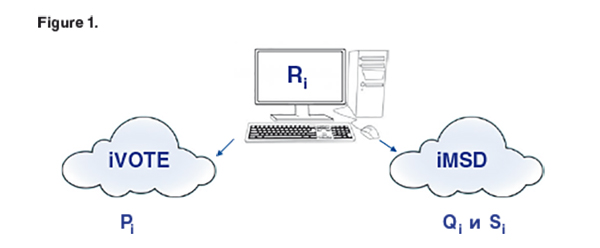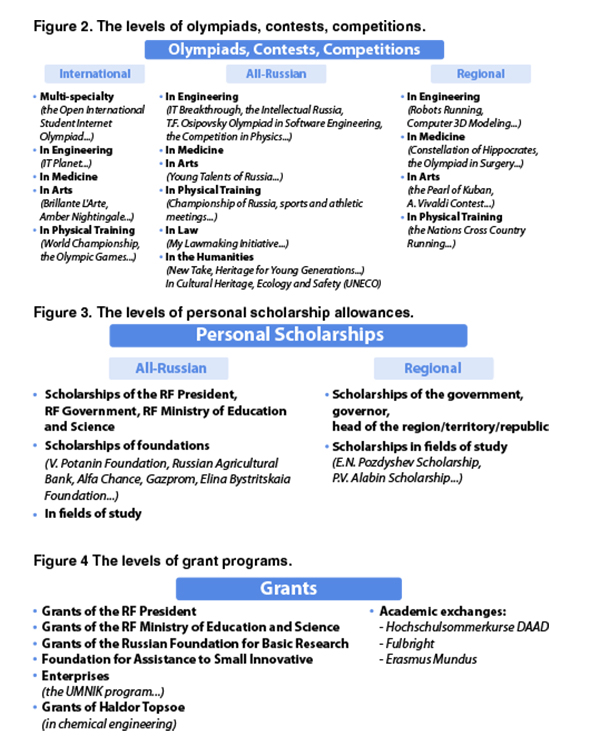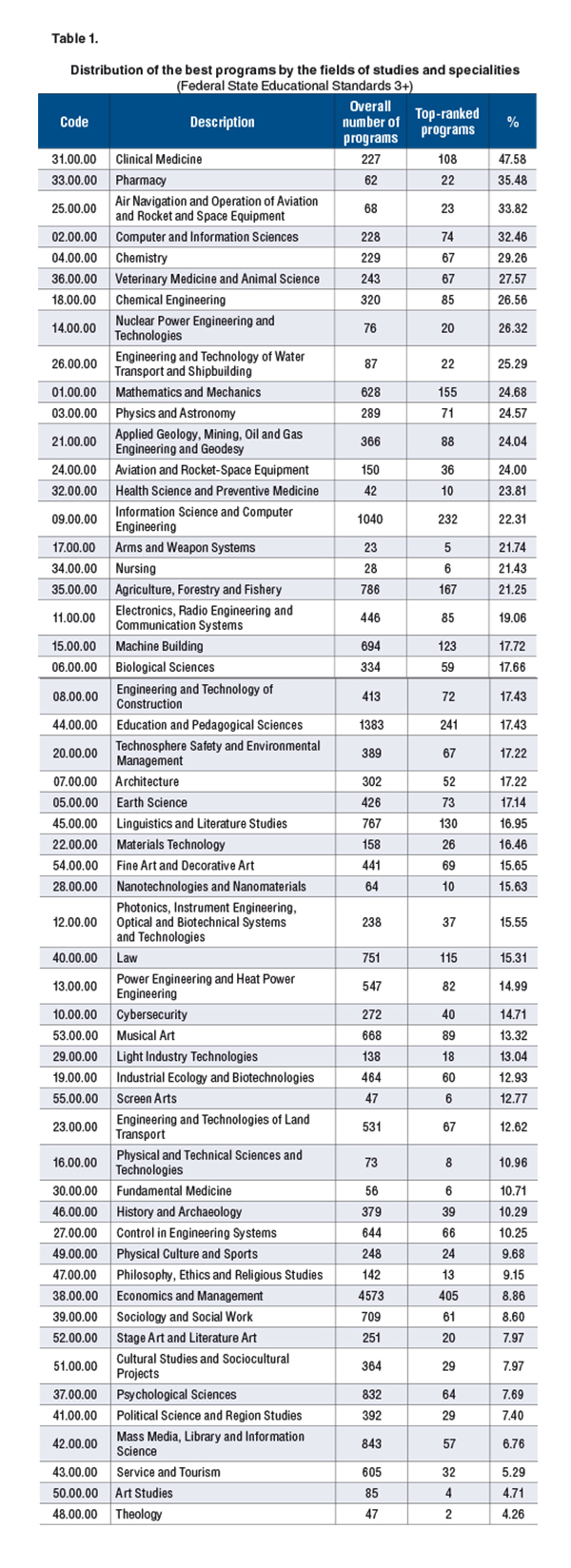Stardom of the best programs
The project Best Educational Programs of Innovative Russia has become a fundamental advance in the development of independent evaluation of the quality of higher education programs. The project has been implemented since 2010 by the Guild of Experts in the Sphere of Professional Education, the National Centre for Public Accreditation (NCPA) and the Accreditation in Education journal. It aims to highlight the educational programs which train highly qualified specialists. The results of the project are based on the expert evaluation of a wide range of stakeholders. Summarizing the results of the sixth round of the project the total of 3,641 educational programs (14.7% of the total number of programs) from 542 educational institutions (34.2%) were top ranked.
The National Centre for Public Accreditation is an autonomous non-profit organization. Its mission is to form and promote quality culture in higher education through identification, evaluation, and accreditation of the best educational programs in compliance with the legislation of the Russian Federation and the Standards and Guidelines for Quality Assurance in the European Higher Education Area. Specialists employed at the Centre enjoy high reputation among the national and international expert community in the field of quality evaluation in education. The official website of the Centre is www.ncpa.ru.
The Guild of Experts in the Sphere of Professional Education is the national professional-public organization which includes 1,095 educators, representatives of training and methodological departments of HEIs including 600 Rectors and Vice Rectors of HEIs, Directors and Deputy-Directors of HEIs branches. All the experts of the Guild underwent training and certification and are fully competent to carry out evaluation. They have extensive expertise in the sphere of education and enjoy strong authority in the academic environment. The official website of the Guild is www.expert-nica.ru.
The Accreditation in Education informational and analytical journal has been published since 2005. It is a specialized national publication, which aims to ensure transparency and accessibility of information on the quality of educational activity, and to inform the professional, expert and academic community, heads of educational institutions and the authorities at different levels on the latest quality assurance issues in education. The journal regularly publishes the results of the project rounds in Best Educational Programs of Innovative Russia. The official website of the journal is www.akvobr.ru.
Evaluation of quality
Summarizing the results of self-analysis, expert evaluation and customers’ surveys, the National Centre for Public Accreditation has been implementing the accreditation ranking system of awarding stars since 2005.
- An educational program winning in the project Best Educational Programs of Innovative Russia is awarded one star.
- An educational program winning in the project three or more times provided it has a NCPA certificate of compliance with the European standards and criteria is awarded two stars.
- A cluster of educational programs, which successfully underwent professional-public (national) accreditation is awarded three stars.
- A cluster of educational programs which underwent professional-public (international) accreditation is awarded four stars.
- A cluster of educational programs which underwent joint international professional-public accreditation is awarded five stars.
Under a cluster of educational programs we understand a group of relative educational programs that can be
evaluated by one external expert panel.
Professional-public (national) accreditation is carried out by independent external Russian experts. The
panel comprises three or four members.
International professional-public accreditation is carried out by a group of independent national and
international experts. The panel comprises five experts including two international experts nominated by the
recognized international accreditation agencies.
Joint international professional-public accreditation is carried out by the National Centre for Public
Accreditation together with a recognized accreditation partner agency. The panel comprises five or six
experts including two or three representatives of an international partner agency. As a result of successful
accreditation the applicant gets two certificates on the joint international professional-public accreditation
(of the national and international formats). The register of the programs certified by the National Centre for
Public Accreditation is published on the official website of the Centre www.ncpa.ru.
Success formula
One of the sources of objective information is the national project Best Educational Programs of Innovative
Russia. The fact that the project has been carried out on a regular basis for six years, independence of
evaluation (it is implemented by the Guild of Experts in the Sphere of Professional Education, the National
Centre for Public Accreditation and the Accreditation in Education journal), wide outreach (over 2,000 expert
evaluations a year), a wide publication of results (the winning programs are included in the reference books
and published in hardcopy and e-form. Since 2014 the reference book has been published in English).
It is not by chance that the project highlights educational programs, rather than an educational institution
itself. For a number of objective reasons there may be weak educational programs even in a strong and
prestigious HEI. On the contrary, a small peripheral institution may feature strong programs well-demanded
on the market.
The evaluation of separate programs is the characteristic feature of the project. All the existing and
previously existing national ranking projects evaluated a university in general, making a differentiation
depending in its profile of the legal form. The success formula of the best programs is completely different
(Fig.1).

Ri= Pi+Qi+Si,
Ri – the total number of points gained by i-th program
Pi – the number of points gained as a result of expert evaluation for i-th program
Qi – the number of achievement points gained by i-th program
Si – the number of student achievement points gained by i-th program
It is for the first time when the methodology of selecting the best programs takes into consideration real
students’ achievements rather than the citation ratio or the number of Nobel prizes or Fields Medal winners.
It is certainly important for a HEI to have strong scientific schools and research that would promote science
and technology, world-famous scholars setting a high standard in science and make the university name
well-known and reputable.
However, in real life it cannot be guaranteed that a famous researcher is an efficient, motivating and
communicative teacher. Moreover, not always applicants select the program depending on the number of
alumni-scholars and their h-index. They are more often concerned about other parameters: the passing
score, employment rate, students’ and alumni’s achievements. But these data have never been used in the
ranking system and the system of evaluation of the quality of education.
There is no system for collection and integration of information on any actions carried out at a HEI on the
evaluation of students’ achievements (contests, olympiads, exhibitions, forums), which is not the only
reason, but still a very important one.
In order to tackle this problem, a platform integrating students’ achievements, alumni’s career success
and the teaching staff accomplishments was developed and used to evaluate the quality of educational
programs. A special module of the data collection enables users to enter the information on a HEI and
educational programs separately.
It is not mandatory for a HEI to upload these data, but those institutions which tried the system, have
already acknowledged the benefits. Students’ achievements are published in an intranet portfolio or on the
official website of a HEI, they are available to the general public, thus representing another reason to be
proud. Moreover an additional emphasis on students’ academic success and achievements (not only on sport
and performance) enhances their motivation to master new knowledge.
There is a risk of false information provision on students’ achievements. Therefore, the project presumes
the stage of data verification: information on students’ achievements should be published on a HEI’s official
website or the website of event organisers.
In the framework of the project we carried out the analysis of international, national and regional olympiads,
competitions and contests. According to the search results, there are 165 events of different levels carried
out in the country. All the olympiads can be conventionally divided into three levels: regional, national and
international (Fig.2).

The project relied on external evaluation of educational programs—first of all, professional-public and
international accreditation. Accreditation certificates issued only by the reputable agencies included in the
international registers (EQAR or Washington Accord) are taken into consideration. Such limitation is imposed
for a good reason: there are currently a lot of “one-day” accreditation agencies established in the country.
The analysis showed that there are currently five internationally recognized agencies operating in Russia
including three Russian (the National Centre for Public Accreditation, the Agency for Quality Assurance
in Higher Education and Career Development and the Association for Engineering Education in Russia)
and two German (the Foundation for International Business Administration Accreditation (FIBAA) and the
Accreditation Certification and Quality Assurance Institute (ACQOUIN)).
Additionally it is possible to use the results of the Unified State Exam. There are always arguments for
and against independence and objectivity of these results, but they have a direct relevance to applicants’
academic achievements. Students in Russia enter a university based on the results of their State Exams,
that enables HEIs to enrol well-deserved students. A high score in a state exam is indicative of prestige,
demand and a potentially high level of training on the program.
Research findings
Making the general public aware of the results of this research is bound to enhance trust to the leading
universities, validate the quality of the delivered programs and become an effective mechanism of improving
an educational activity. Providing access to the project results creates a positive image of a HEI, its
adherence to the academic elite universities, which offer high level training to its students.
In 2016 the project results were for the first time used for compilation of different rankings.
In this context, the information on the best programs grouped by the fields of studies and specialities, which
were top ranked in 2017, is essentially relevant (Table 1).
You are welcome to discover the stardom of the best educational programs delivered by the Russian higher
education institutions.
